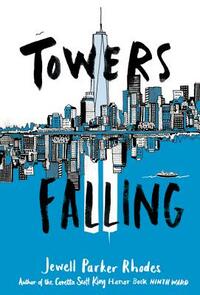Take a photo of a barcode or cover
Excellent reminder of 9/11 and a timely explanation of how those events still affect us today.
Books like this are going to be really important for our students today.
This book hits so many great notes! Deja is a 10-year-old 5th grader in a new school. She lives with her parents and 2 siblings in a homeless shelter in Brooklyn. From her school windows, they have a vew of Ground Zero and it is 15 years after the 9/11 attacks. Deja is African American and soon makes two new best friends - Ben, a bespectacled white boy, and Sabeen, a Muslim girl. They are a powerful team. The book tells the story of 9/11 in a way that helps young people who weren't even born when it happened understand what it means to all of us.
I reread this in Sept. 2017 for a book club. Despite the fact it is a book written for readers ages 10-12, these adults really liked it. More than one person expressed a reluctance to read a book about 9-11 but then found this one was so well done, the theme didn't overwhelm them.
This is an excellent book also for teachers to use with pre-teens to put 9/11 in a context they will understand. There is excellent pedagogy in the book, particularly tasks the students have to do that involve critical thinking. The voice of Deja the main character is authentic, and everyone commented on the deep authenticity of the book. Parker Rhodes was reluctant to write this book, and went to Brooklyn to talk to educators and others who witnessed 9/11. It is a great book for social studies teachers who will be familiar with the children's asking why they have to learn about the past. It is a book that helps us to understand why the past cannot be ignored and that it continues to live with us.
I reread this in Sept. 2017 for a book club. Despite the fact it is a book written for readers ages 10-12, these adults really liked it. More than one person expressed a reluctance to read a book about 9-11 but then found this one was so well done, the theme didn't overwhelm them.
This is an excellent book also for teachers to use with pre-teens to put 9/11 in a context they will understand. There is excellent pedagogy in the book, particularly tasks the students have to do that involve critical thinking. The voice of Deja the main character is authentic, and everyone commented on the deep authenticity of the book. Parker Rhodes was reluctant to write this book, and went to Brooklyn to talk to educators and others who witnessed 9/11. It is a great book for social studies teachers who will be familiar with the children's asking why they have to learn about the past. It is a book that helps us to understand why the past cannot be ignored and that it continues to live with us.
4.5 I was teaching fifth grade in 2001 when 9/11 happened and fourth grade fifteen years later. It's such a difficult thing to discuss with kids. For the first few years it was easier to talk about, because students were around during the horror and, even if only peripherally and protectively, heard about it. But as years passed, some parents didn't want to scare their kids and were reluctant for it to be taught in school. I read this in anticipation of having an "Examining 9/11 through Literature" session at the library for tweens, but I'm still unsure if I'd use this title. As an adult, I loved the way it was written and the way all the information about that atrocious time period evolved throughout the book. I loved that Rhodes put Deja and her family in a homeless shelter, and I love that she also used a wonderful, safe school for her to go to - yes, they exist! The ending was a little to sugary, but the entire concept was excellent, powerful, and very, very really.
Everyone knows where they were when the Twin Towers fell. But kids now have no context of 9/11. This book tells the story of fifth grade Dèja, a homeless black girl, who is learning about the attack for the first time at her NYC school, discovering that it has affected her life more than she could ever imagine. Own Voices. F & P Level W.
Deja's father is sick. He hasn't been able to hold down a job that Deja can remember. While Deja's mother does the best she can, they were evicted from their apartment. After living in their car for a month, they find a place at a homeless shelter for families. The Avalon is not great, but it is in a better part of Brooklyn then they had lived in before, and Deja starts fifth grade at the best school she has ever gone to. Much to her surprise she is immediately befriended by Ben, who just moved to New York from Arizona, and Sabeen, whose family comes from Turkey. Since it is the 15th anniversary of 9/11, the fifth graders are studying what happened in an integrated curriculum unit throughout their different classes. Deja had never heard of this event, but with the support of her new friends and her teachers, she begins to see how it impacted her own family, particularly her father. This well-crafted and compelling novel is a perfect introduction for a generation of children born after the towers fell. They will make the discovery along with Deja and see how history, both recent and ancient, continues to affect us all. Highly recommended for grades 4 & up.
ARC provided by publisher
ARC provided by publisher
“Home is more than a place.”
“History is dead. Not alive. It doesn’t mean anything if they don’t teach us the whole story.”
“All I know is, I’m more grown than my parents and teachers think I am.”
As a teacher I really liked how this story was framed using place and connection and having the students think through why we study history and why it’s important. Kids are capable of handling more than we think and this book shows we can share difficult histories with them in a gentle way.
“History is dead. Not alive. It doesn’t mean anything if they don’t teach us the whole story.”
“All I know is, I’m more grown than my parents and teachers think I am.”
As a teacher I really liked how this story was framed using place and connection and having the students think through why we study history and why it’s important. Kids are capable of handling more than we think and this book shows we can share difficult histories with them in a gentle way.
I finished Towers Falling on Jan 31st. I think this book is very relevant and important for students to read. Not only does this book discuss 9/11, but it also addresses the importance of history. Dèja starts off thinking history is not important because it happened in the past. Many of our students may feel that way too. I would read this book with upper elementary and middle school students. I would also have a conversation with students that have read this book.







